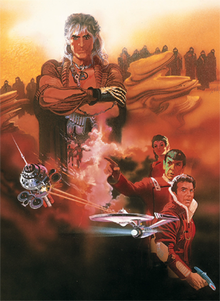Star Trek II
| Star Trek II: The Wrath of Khan | |
|---|---|

Theatrical release poster art by Bob Peak
|
|
| Directed by | Nicholas Meyer |
| Produced by | |
| Screenplay by |
|
| Story by |
|
| Based on |
Star Trek by Gene Roddenberry |
| Starring | |
| Music by | James Horner |
| Cinematography | Gayne Rescher |
| Edited by | William Paul Dornisch |
| Distributed by | Paramount Pictures |
|
Release date
|
|
|
Running time
|
112 minutes |
| Country | United States |
| Language | English |
| Budget | $11.2 million |
| Box office | $97 million |
Star Trek II: The Wrath of Khan is a 1982 American science fiction film directed by Nicholas Meyer and based on the 1960s television series Star Trek created by Gene Roddenberry. It is the second film in the Star Trek film series and is a stand-alone sequel to Star Trek: The Motion Picture (1979). The plot features Admiral James T. Kirk (William Shatner) and the crew of the starship USS Enterprise facing off against the genetically engineered tyrant Khan Noonien Singh (Ricardo Montalbán), a character who first appeared in the 1967 Star Trek episode "Space Seed". When Khan escapes from a 15-year exile to exact revenge on Kirk, the crew of the Enterprise must stop him from acquiring a powerful terraforming device named Genesis. The film is the beginning of a story arc that continues with the 1984 film Star Trek III: The Search for Spock and concludes with the 1986 film Star Trek IV: The Voyage Home.
After the lackluster critical and commercial response to the first film, series creator Gene Roddenberry was forced out of the sequel's production. Executive producer Harve Bennett wrote the film's original outline, which Jack B. Sowards developed into a full script. Director Nicholas Meyer completed its final script in 12 days, without accepting a writing credit. Meyer's approach evoked the swashbuckling atmosphere of the original series, and this theme was reinforced by James Horner's musical score. Leonard Nimoy had not intended to have a role in the sequel, but was enticed back on the promise that his character would be given a dramatic death scene. Negative test audience reaction to Spock's death led to significant revisions of the ending over Meyer's objections. The production team used various cost-cutting techniques to keep within budget, including utilizing miniature models from past projects and reusing sets, effects footage, and costumes from the first film. Among the film's technical achievements is being the first feature film to contain a sequence created entirely with computer-generated graphics.
...
Wikipedia
